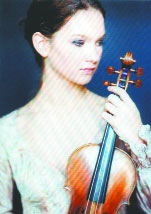After stunning achievements with Bach, Hilary Hahn turns her attention to Mozart
But it was Hahn’s début recording of three of J.S. Bach’s sonatas and partitas for solo violin, set down for Sony when she was 17, that immediately put her in the international spotlight. That she sailed through Bach’s technically challenging compositions with ease was less astonishing than how she invested those works with emotional nuance and textual coherence.
Now 23, Hahn’s growing discography has earned her two prestigious Diapason d’Ors. She has also received a Grammy and two Golden Ear Awards from “The Absolute Sound” (one bestowed by this critic) for her Sony disc of the Brahms and Stravinsky Violin Concertos. To hear her tone instantly transform from masterly declamation to infinite sweetness bestows the Brahms with a heart-tugging freshness usually reserved for flowers in first bloom.
Currently on a U.S. tour, she performs what is sure to be a stunning recital in Newark’s New Jersey Performing Arts Center on February 15. Accompanied by Natalie Zhu, with whom she has worked since their student days in Philadelphia, Hahn’s program includes the Mozart E Major Sonata, Bach Partita No. 2, the Bloch Sonata, and the Mozart Sonata in A Major.
Early last September, Hahn and I spoke by phone. What impressed me most was the girlish innocence and unadorned simplicity with which she expressed herself. Eschewing all airs of self-importance, Hahn remained charmingly self-possessed and soft-spoken as she addressed questions designed to probe the essence of her creative genius.
Asked why she chose to perform Mozart, Hahn explained that she plans to record four Mozart sonatas, including the two on the program, over the next few years.
“These two are the ones that Natalie and I have always liked reading together,” she said. “I thought it might be fun to put some more time in on them and actually learn them. They’re very interesting to dissect and put back together again.”
Asked whether she finds herself able to express more feelings in her playing as she has gotten older, Hahn responded, “I think the feelings are always there; you just have to learn from your teachers how to bring them out in the music. My teachers always thought that musicality was important as well as technique, so I was taught how to express myself through the music.
“You just can’t think it and have it happen,” she added laughing bashfully. “It’s in the practice room that I figure out what I want to express and how it’s going to be done.”
Was it difficult for her at first to bare her soul onstage and get to the heart of the music?
“I don’t feel like I’m ever not baring my soul,” Hahn said. “But at the same time, I can’t entirely forget what I’m doing and delve so deeply into the music that I lose track of everything. Then I might actually get lost in the music. I have to keep a certain logic going during the concert to keep track of what I’ve done, what I’m going to do, and how this phrasing relates to that.
“I’m always changing the way I play a little bit,” she continued “That’s how I develop in a lot of different ways. I have to make sure the little details I alter on the spur of the moment actually play out in a way that makes sense later on. Once you change one little thing, it changes the whole proportion of the piece. It’s like painting a face; you make the nose a little different and the whole face looks different. Then you have to figure out how that’s going to affect the rest of the painting.”
Bach has been Hahn’s companion since an early age. She played the Siciliano and Presto from his solo Sonata in G Minor in recital when she was 10, and played the E Minor Concerto when she was no older than 13. Universal Classics recently released her latest recording of Bach violin concertos.
“Bach is a lot of fun to work on because there’s always something new to discover in it,” Hahn said. “Once you’ve thought an interpretation through, it usually works pretty well. Anyone can hear what you’re doing and interpret it for themselves; interpretation in Bach does not stop with the player. There’s no standard interpretation, and the traditions that you’re supposed to follow in Bach depend on whom you talk to [laughing]. With Bach, as long as what you do has logic to it, and as long as you feel it that way yourself, there’s no reason why you can’t try it.”
As Hahn was about to depart for a Manhattan Tower Records appearance, I asked if her creative process involved first hearing the sound that she wanted to create in her head and then attempting to play what she had imagined.
“You always envision what you want to do ahead of time,” Hahn explained. “The violin plays a role because it can do certain things, but it’s more the case that when I want to try something and want to get a certain sound, I work until I get it on my violin. My violin is very flexible so it can do almost anything I want it to do. But it has also gotten used to the way I play––it sounds weird I know––so it can respond pretty quickly to what I’m trying to get it to do. I don’t think it really influences what I feel I can do because it’s often the case that I discover something on my violin that I wasn’t aware was possible. It’s an ongoing process.”


































